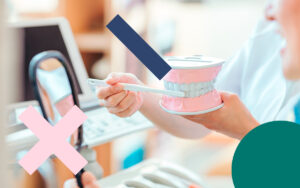Halitosis or bad breath is known as the set of unpleasant odours that emerge from the oral cavity. This is a fairly common problem in adults and young people, who look for different solutions to maintain a fresh breath that does not prevent them from living a normal life.
In most cases, halitosis originates in the mouth. It is here that bacteria accumulate and form a thin layer of biofilm on the teeth, gums, tongue and other soft tissues, worsening the situation when proper oral hygiene is not performed.
Are you also concerned about halitosis and want to keep your breath fresh and odour-free? Take note of these professional tips to achieve this in an effective way.
The importance of fresh breath
Fresh breath is associated with good oral health. On the contrary, when there is a halitosis problem is that something is not going well in the oral cavity.
For this reason, bad breath should not be overlooked. It is not just a detail that can cause a complex when others notice it. Halitosis goes much further, and is an indicator of bacterial overgrowth in the mouth, as well as possible digestive or ENT problems. It is necessary to act at any small sign!
How long does fresh breath last?
Fresh breath should last all day long. For this, it is necessary to maintain regular oral hygiene throughout the day, eliminating food remains after eating, so that they are not available to the bacteria that we have naturally in the oral cavity.
In most cases, halitosis comes from the decomposition of food produced by bacteria and is usually related to microbial overgrowth, which, if not treated correctly, could lead to problems such as tooth decay or gum inflammation.
Performing a correct brushing technique and using the right oral hygiene and care products is more than enough to limit the appearance of halitosis and thus enjoy fresh breath for a longer period of time.
Why do I have bad breath if I brush my teeth?
In addition to the action of oral bacteria, there are other reasons, although much less frequent, for the appearance of bad breath. One of the problems that prevent us from having fresh breath even with frequent brushing is dry mouth.
Saliva has several functions, among them the neutralization of acidity for the protection of teeth and gums. Thanks to saliva, it is more difficult for oral bacteria to develop.
But if there is a condition of xerostomia, or decreased saliva production, halitosis can occur. In addition, lack of fresh breath is related to the presence of cavities and periodontal problems, respiratory infections, gastrointestinal problems, and certain unhealthy habits such as ingestion of odour-causing foods, alcohol or tobacco.
Tips for fresh breath
What can I do to maintain fresh breath while taking care of my oral and general health at the same time? These are the tips given by oral hygiene experts to prevent and treat halitosis:
Brush your teeth
Daily brushing is the key to removing food debris and preventing the formation of dental biofilm. It is important to always do it after every meal, but especially in the morning, after eating and before going to bed at night.
Maintain a correct brushing technique, covering the surface of teeth and gums. Do not forget to clean the tongue as well, where most of the bacteria responsible for bad breath accumulate. And when you finish, clean and disinfect your toothbrush. It is important to remember to renew your toothbrush every 3 months.
Flossing
Combine brushing with the use of dental floss or floss, interproximal brushes or other accessories to reach the space between the teeth where the bristles of the toothbrush cannot reach. Right between the teeth and under the gum line is where most food debris accumulates without us realizing it.
Mouthwashes and sprays for bad breath
In addition to a toothpaste with the appropriate content of fluoride , you can complete your oral hygiene with a mouthwash or rinse. The line of KIN Fresh line is specially designed to prevent and treat bad breath, with a spray that eliminates halitosis that lingers after brushing. Use them daily!
Hydration
Make sure you drink enough water to keep your mouth well hydrated, preventing symptoms of dryness or xerostomia. Opt mainly for water or natural infusions, eliminating or limiting the consumption of coffee, soft drinks and other unhealthy beverages.
Adequate food
Follow a healthy and balanced diet, taking care of the health of your digestive system. Avoid foods with strong odours that interfere with fresh breath, as well as foods that may be heavy on the stomach.
Visit the dentist
Finally, and equally important, be sure to visit your dentist at least once a year. If you also notice that your breath is not as fresh as usual, make an appointment immediately to detect any problems in time and start the corresponding treatment as soon as possible.
Enjoying fresh breath is not only a matter of aesthetics, but also of health. Fortunately, in most cases, halitosis problems are easily combated by simply correcting the daily habits that help us take care of our oral health.
BIBLIOGRAPHY
- Halitosis. Know it a little better – Colegio Profesional de Higienistas Dentales de Madrid.
- What about halitosis? – Official College of Dentists of Extremadura.
- Oral health tips for the elderly population – Ilustre Colegio Oficial de Odontólogos y Estomatólogos de la 1ª Región.








